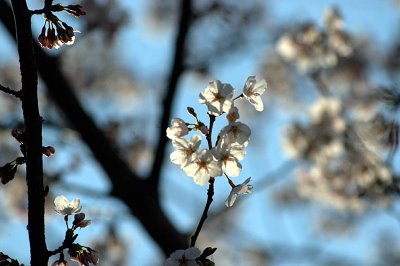
After our mutual language lesson, In-hye and I strolled among the beautiful cherries on the way to her apartment. People were everywhere. School had just let out, and the children looked up and admired the blossoms as they walked home.
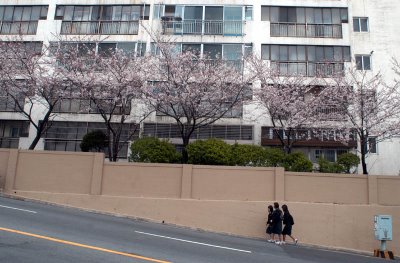
The streets looked like a final winter storm had come in the night and coated only the trees in a brilliant, pinkish snow.
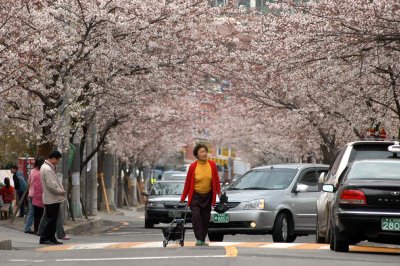
In-hye and I have plans to travel to Jinhae on Saturday and see the country's largest collection of cherry trees.
Jin-hae is also the birthplace of Admiral Yi, Sun-shin. In the late 16th century, Admiral Yi repelled a massive Japanese invasion force with only a small collection of ships outfitted with thick iron armor. These "Turtle Ships," as he called them were nearly impervious to the Japanese attacks. Admiral Yi lured his foe into shallow inland waters that he and his commanders knew by heart, and ambushed them. Trapped, outgunned and outmaneuvered, only a handful of the 400-plus Japanese fleet made it back in one piece.
Admiral Yi was an admirable man in character as well as deeds. At one point, the Joseon emperor of Korea was unhappy with Admiral Yi for being cautious in a key battle against the Japanese a number of years earlier. The imbecile demoted Admiral Yi all the way to the lowest rank in the Korean navy and took away his command.
According to the report made by one of my high school students, Admiral Yi did not flinch when the emperor demoted him. He took his medicine and his place among the men he once commanded without complaint. He became accustomed to the simple life of an ordinary foot soldier and he gained respect among the rank-and-file for his humility. His wisdom and patience paid off.
Without their brilliant tactician, the Koreans began loosing hand-over-fist to the Japanese, handing over port after port to the conquerers. The emperor quickly and quietly reinstated Admiral Yi, gave him what was left of the battered Korean navy, and ordered him to do the impossible, which he did in the battle described above.
A statue of Admiral Yi stands in Yongdusan park, dutifully watching over the deep-water harbor that has been the catalyst for Busan's growth and prosperity. The Koreans celebrate his life every year in Jinhae in conjunction with the cherry blossom festival, and I look forward to learning more about this great man.
The coming of spring has allowed a few bubbles of warm air to rise up from south Asia and collide with all that remains of the bitter winter cold. Clouds darken the sky weekly and soak the streets with a driveling rain. For most of November, December and January, the dry cold winter air kept the sky a deep blue day-in and day-out. As the warm weather returns, so does the rain.
I am not a big fan of the rain, especially on the weekend when I like to ride my motorcycle around the city and explore new places. I find it to be so depressing.

Other people are not so easily deterred. Check out this family on their motorcycle. It disturbs me how frequently I see a family on a motorcycle and none of them have helmets.
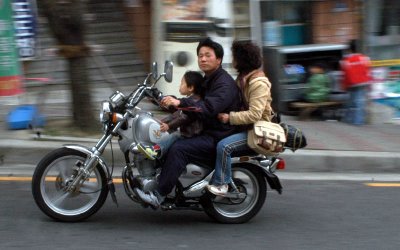
Gavin and I went out to Gwangali this weekend because I had read on the internet about a raw fish festival to be held there. Turns out the website got the date wrong and all we found was gray clouds, rain and a few diehards in galoshes out for a stroll.
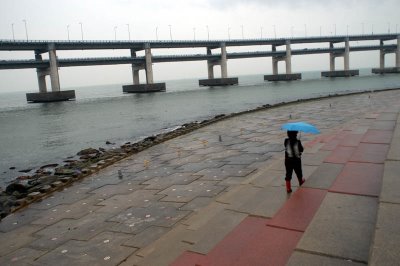
Sunday was better suited for exploring, the weather having cleared up over night. However, I was tired, and my exhaustion compelled me to spend a day indoors getting some down time. I worked on my website for most of the day. In the afternoon, I moseyed around Young-do, basking in the late afternoon sunlight. More people then usual were out of their house doing likewise.

I climbed a small terraced hill near Dongsamjugong and came across a long, handmade stone wall on the summit. A family joined me, laughing as they walked between the rows of produce.
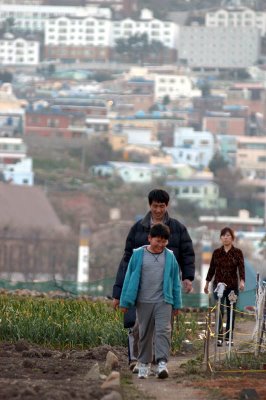
Children romped around in the playground by Dongsamjugong.
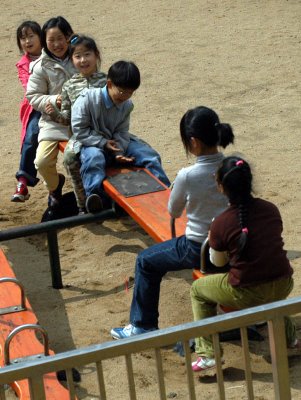
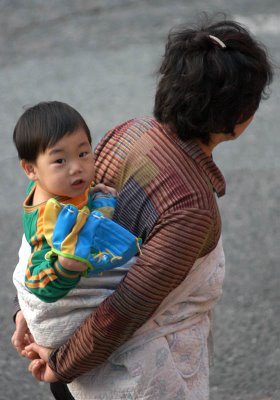

I have reached the midpoint of my journey in Korea. There are six months behind me and six more ahead of me. I look back and wonder where the time went, and though I try to focus on the shoebox of accomplishments, my mind invariably wanders towards the warehouse of things left undone.
Complicating matters is a growing longing for home. Korea can be a very lonely place. The language barrier tends to reduce most conversation to little more than stock phrases from my handbook. What few people who actually can speak a little English usually do so very poorly. Even with the best English speakers I still spend a lot of time sorting through their words, trying to figure out what they are saying and then trying to craft my own sentences around a perceived level of comprehension. This can be exhausting, and I often lose my focus on the person. It is hard to build relationships this way.
Complicating matters is the Koreans' tendency to hold westerners at arms-length, so to speak. A friend of mine told me that Korean women don't like being seen walking alone with a western men because such women are perceived as prostitutes. I don't know how much of that is true, but I do know that whenever I start talking to a Korean in English in public, they get very nervous. Other Koreans stare hard at them. Whenever we go somewhere together, the Korean staff is careful not to appear too close to Gavin, Dave and I. They like us, I know they do, but it feels like they don't want anyone outside of ESS to know that.
I also miss my family. There is something to be said for having a group of people who love you no matter what, who ask nothing of you except that you exist, who will always be ready to throw their arms around you and shed some light on the darkness. I draw much of my personal strength and confidence in myself from their love for me. Without them near, I have been forced to assess myself and my life from the sobering vantage point of near-total autonomy.
One night last week I dreamed that I was in a Chili's restaurant with my mother, father and sister. We just sort of walked in and suddenly all of these smiling, busty green-eyed brunettes started bringing us food: Steak, fries, burgers, double-stuffed potatoes and bowls of soup and salad piled up on our table. My parents were hugging me and my sister was cracking jokes and laughing at the smiling waitresses as they hit on me. In the background of the dream my mind was chanting this odd sort of monosyllabic litany of western foodstuffs to a slow, trance-techno beat.
"Pizza and potatoes and burgers and fries and..."
I woke up the next morning and my mind was in darkness, the dream having only reinforced my solitude.
Having Gavin around helps a lot. He is a good friend and an excellent roommate. We bounce teaching ideas off of one another, collaborate on projects and watch each other's back. Heck, if it weren't for him, I'd still be melting brain cells with soju!
Gavin and I also share a similar question: What next? This question is a poisonous seed in my mind that has sprouted and grows larger with every day that I get closer to completing my contract and departing Korea. My original idea was to save enough money to build a freelance photography career in the States. However, over the course of six months the realities of such an endeavor have stacked up against itself. What was once a dream seems more like a wild gamble without a lot more money and time.
Some people spend a decade or more building the contacts necessary to get enough work on which to live. Also, the camera equipment I would need is professional grade (read: really, REALLY expensive). A car, laptop with wireless FTP capabilities, health insurance, car insurance, a place to live, food...The list goes on and on, the calculator in my head tallying a bigger and bigger number.
With a modest savings I would have after my time here, freelancing is still a gamble. Even if I lived at home, with my rent and food taken care of, I'd be starting from zero professionally. I would have to wait tables, shoot weddings, or assist other photographers to make ends meet while I climbed the ladder. Do I want to do all of that? Or do I want to complete another year in Korea and pile up another stack of cash? My sister might be teaching in Japan. Should I join her? The money is not as good, but 'they' say cultural experience can't be beat. Can I start a career after that?
And so goes the thinking of a man without a clear route in life. I go to bed every night wrapped up with these thoughts, and I wake up to them in the morning. They walk with me to the gym and they distract me while I teach class. Some days I think maybe the way will be made clear for me if I just let it. Just live your life, Stephen. Quit worrying. God or fate will provide. But am I so important that the Almighty even gives a damn about me? What if God has forgotten me? What if my fate is to have none at all? No one can take responsibility for my life but me, right?
No matter how I cut it, sitting on my laurels is not an option. I don't want to be like Julie: A year behind me, a little money in my pocket and no where to go but home. I need a next step. If I can't find one, I'll stay here, teach and make money. I like teaching, I like money, and both of those things will vanish in America.
Sorry about the heaviness. I guess it would be uncouth for me to wrap up SoKoNotes on such a low note. Here are a few phrases of Konglish for you to try and figure out. What were they thinking? Post your replies on my comments page.
"I give a present that cream."
"My favorite foot was cake."
I'll try and have something more to say next week. One of the problems of living in a place for six months is that it starts to lose the brilliant polished shine of its former 'newness.' Despite the language barrier, despite the low-level racism, despite the loneliness, Busan has become my home, and I view it through the narrow slits of familiarity. I can tell because my camera's memory card has no photos on it even by Thursday. I can tell because I see the same streets and buildings day-in and day-out, even when I try not to. The physical make-up of the city is now as familiar as Atlanta. I could tell you how to get from Haeundae to PNU no problem. Now all that remains to be explored is it's human side, and as I said before, the language barrier is going to make that difficult. But hey, I have six months...
--Notes
No comments:
Post a Comment